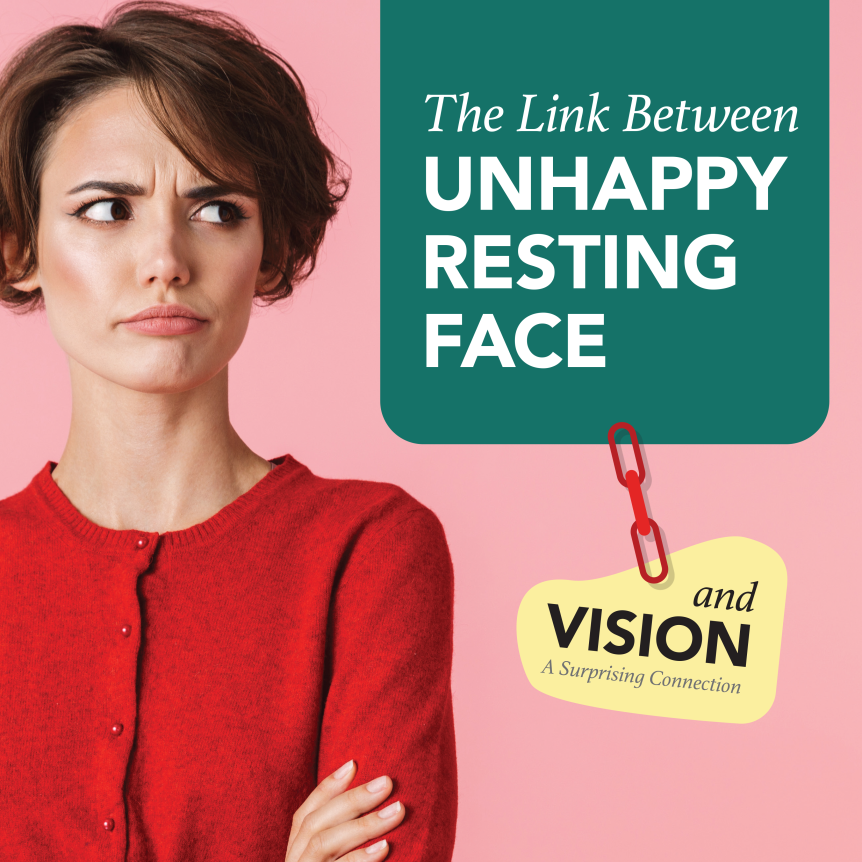Have you ever been accused of having “Unhappy Resting Face,” (Yes! I have changed the actual term to be more reader appropriate.) a term used to describe a facial expression that appears unfriendly, unapproachable, or standoffish when at rest? If you have, you might be surprised to learn that the root cause of this perception could be a vision problem. It turns out that your inability to see clearly without even realizing it may be contributing to the social label that doesn’t accurately represent your true personality. In this article, we’ll explore the surprising connection between “Unhappy Resting Face” and vision impairment.
The “Unhappy Resting Face” colloquially, is a term used to describe a facial expression characterized by an unintentionally stern or unfriendly appearance when a person’s face is at rest. Individuals with URF often receive feedback that they look unapproachable, disinterested, or even hostile, even though this may not accurately reflect their true emotions or intentions.
The Vision-Vibe Connection you ask?
It may seem unusual, but there is a growing body of evidence suggesting that poor vision can contribute to the perception of URF. How does this happen? Let’s delve into it.
Squinting
When someone has trouble seeing clearly, they may unconsciously squint to improve their focus. Squinting can change the natural position of the eyebrows and mouth, causing a facial expression that appears more serious or unapproachable.
Furrowed Brows
People with vision problems often strain their eyes, leading to furrowed brows and a concentrated facial expression. This can be mistaken for anger or indifference.
Miscommunication
Impaired vision can hinder one’s ability to make eye contact or engage in non-verbal communication effectively. As a result, people may misinterpret their intentions or emotions, assuming they are aloof or disinterested.
About now, you are probably wanting to know how to best address this issue. That’s easy- If you suspect that your vision might be contributing to the perception of URF, it’s essential to take action.
Here are some steps you can consider:
Get an Eye Exam
Schedule an eye examination with an optometrist or ophthalmologist like those found at WK Eye Institute to assess your vision. Corrective lenses or vision therapy can help improve your eyesight and potentially alleviate the unintentional stern expression.
Practice Facial Relaxation
If poor vision has caused you to adopt a strained facial expression, practice relaxation techniques to help you maintain a more open and approachable appearance when your face is at rest.
Communication Matters
Be mindful of your verbal and non-verbal communication to ensure that your true emotions and intentions come across accurately, regardless of your facial expression.
The next time someone accuses you of having “Unhappy Resting Face,” consider the possibility that your vision may be playing a role in this perception. While the term itself may not be the most tactful way to describe a facial expression, understanding the connection between poor vision and URF can help you take steps to address the issue. By seeking appropriate vision care and practicing facial relaxation techniques, you can ensure that your facial expression accurately reflects your true personality and emotions. Remember, a warm and friendly demeanor can go a long way in improving your social interactions and relationships.
WK Eye Institute
North (318) 212-2020
South (318) 212-5901
Pierremont (318) 212-3937

